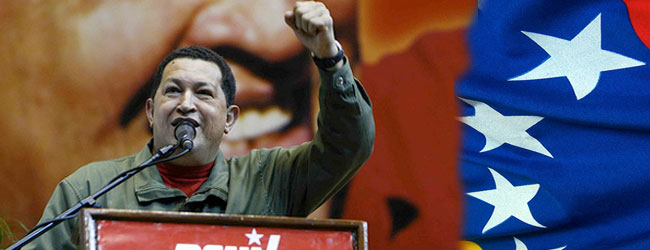2 July 2010
INTERNATIONAL: Venezuela’s drive for ‘21st century socialism’ BY SEÁN Ó FLOINN
 Chávez takes ‘anti-people firms’ into public ownership
Chávez takes ‘anti-people firms’ into public ownership
DURING one his ‘Aló Presidente’ six-hour weekly state television shows packed with political announcements and revolutionary pronouncements, Venezuela’s socialist President Hugo Chávez announced plans to take over more private companies.
In his 11-year tenure, Chávez has taken a host of businesses into public hands, from oil to food production. The profits of these companies, which were previously siphoned off into the bank accounts of the wealthy elite, are now being used to bankroll Venezuela’s Bolivarian Revolution and to fund its numerous accompanying social programmes.
The words ‘nationalisation’ and ‘expropriation’ have negative connotations in the Americas that have been encouraged by the capitalist media, who equate them with theft. However, under Venezuelan law, the owners of all companies that have been nationalised are compensated with their market value. Chávez himself said that he will only nationalise those companies which contravene laws, infringe on workers’ rights, and adversely affect the national economy. To los Capitalistas, nationalisations are only acceptable when they are designed to bail out bankers; for them, nationalising profits is an act of despicable communism.
On June 2nd, thousands of Venezuelans marched in favour of nationalisations and anti-corruption measures, which took place in the wake of the recent arrest by the Bolivarian Intelligence Agency (SEBIM) of state-owned food producer PDVAL President Luis Pulido on charges of hoarding food. Over 30 tons of decomposed food products, including oil, sugar, coffee, butter, rice, meat, pasta and milk, were discovered by authorities in containers. This was an act of economic sabotage with corrupt officials trying to provoke product shortages. Chávez publicly condemned the corruption, stating that such practices are anathema to the raison d’être of PDVAL and its noble mission of providing food at state-regulated prices and called for those responsible to be imprisoned.
The Venezuelan Government is also expropriating several small food distributors and other companies who have violated price controls and have hoarded items to create shortages and raise inflation, which currently stands at 30%. Chávez remarked:
“The bourgeoisie have declared economic warfare against me and I call on workers to join with me in the fight to take back our economy.”
President Chávez also spared some vitriol for Lorenzo Mendoza, billionaire owner of Empresas Polar, the nation’s largest food and beverage producer and distributor.
Mendoza’s company has been implicated in hoarding goods in its warehouses, resulting in public panic, and then releasing them at higher prices, causing inflation and crippling the economy. They have also been criticised for attacks on workers’ rights, pay and conditions. He warned Mendoza that if his company continues these immoral practices then he will nationalise it. He directly challenged Mendoza in his combative style, saying:
“Let’s see who lasts longer - you, with your Polar and your riches, or me, with my people and the dignity of a revolutionary soldier.”
This policy of nationalising companies is strengthening worker participation in society and empowering the forgotten masses. It is an integral part of Chávez’s construction of 21st century socialism. It is putting companies at the service of the people under the direct control of workers. In response to criticisms that nationalised companies are performing poorly, Venezuelan vice-president Elías Jua claimed that production has increased in 80% of nationalised companies over the last decade.
José Mora, a leader of the Union of Socialist Workers and National Assembly member, lauded nationalisations stating:
“We are producing for the country. We are producing for the population. Business people produce using workers to get richer, exploiting workers.”
It is a practical implementation of a great socialist ideal of producing on a collective basis for the collective well-being and, much to the chagrin of Venezuela’s capitalist class, it is working.
On May 15th, speaking of Plan Guayana Socialista, Chávez appealed to workers to promote workers’ control and the election of managers from below. One small example of workers producing without bosses is the Gotcha Workers, a group of female textile workers whose previous owners closed down their factory. The former bosses fled without providing any compensation for the workforce. The staff responded by taking control of the factory and are now producing and selling directly to the local communities. Two weeks before, Chávez told a gathering of workers:
“Wherever you see a private company, a capitalist company that is exploiting the workers and is not complying with the laws, that is hoarding, denounce it, because the government is willing to intervene. Factories that close down should be occupied by the workers.”
In his most recent address, Chávez also criticised large multinational companies Coca-Cola and Pepsi for wasting water and using large quantities in their production processes. Water shortages have resulted in power cuts and rationing. He said: “Water in the first place belongs to the people. Water is social property.”
The conservative assertion that private is good and public is bad is being directly challenged in Venezuela. As capitalism wreaks increasing havoc throughout the world, it is inspiring that Venezuela is not only preaching about an alternative socialist economic system but is actually putting it into practice.
Follow us on Facebook
An Phoblacht on Twitter
Uncomfortable Conversations

An initiative for dialogue
for reconciliation
— — — — — — —
Contributions from key figures in the churches, academia and wider civic society as well as senior republican figures




